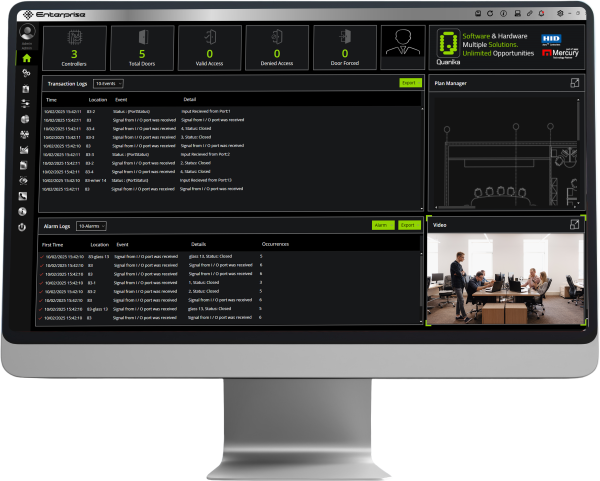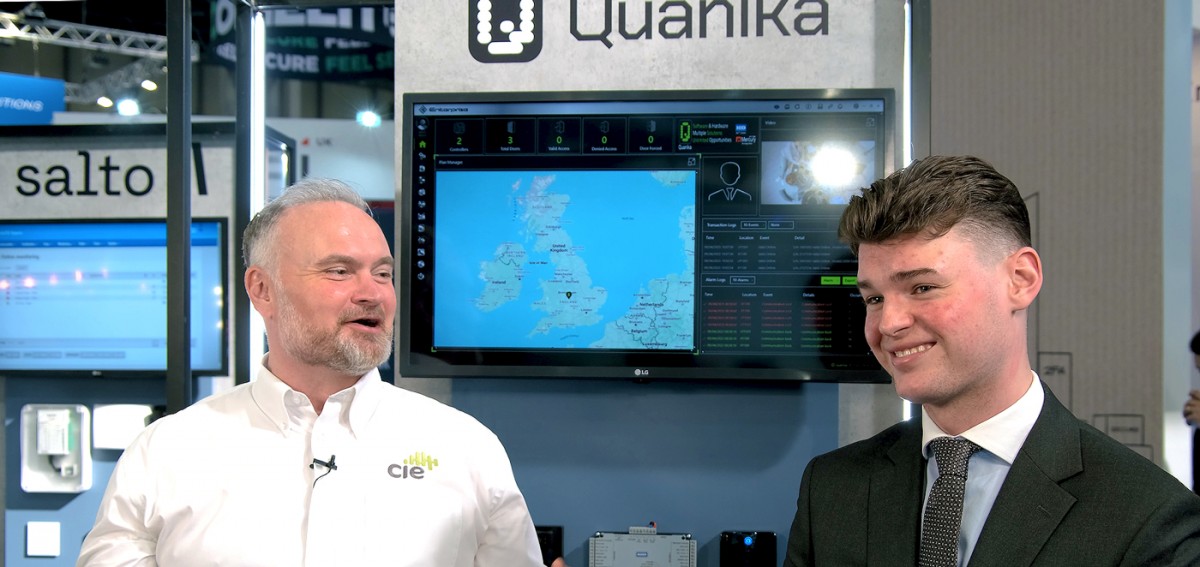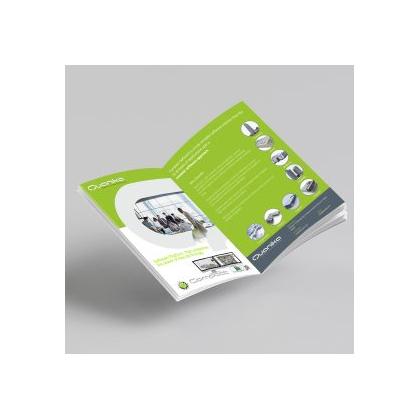How Quanika Unified Platform is redefining building security and integration
Quanika is revolutionising building security with a unified building system management platform that integrates access control, video surveillance and visitor management - simplifying operations, boosting efficiency and transforming how modern facilities are managed.
At The Security Event 2025, held at the NEC Birmingham, CIE's Chris Edwards sat down with Will Copland of Quanika to explore how the company is transforming complex building operations into streamlined, efficient and secure environments. In a sector crowded with proprietary systems, legacy infrastructure and siloed platforms, Quanika is proving that a unified solution isn’t just possible - it’s already here.
“With Quanika, we have a very fluid intelligence software,” Copland explained. “It means we can take different types of software and use them together as one solution within the hardware.”
The Vision: Integration without complication
At the heart of the conversation, Copland articulated Quanika’s central vision: to provide a 'single pane of glass' for managing various building systems. Whether it's access control, CCTV, visitor management, or fire and intruder alarms, Quanika brings disparate technologies together into a unified, intuitive platform.
“Let’s say you have an access control system, CCTV and a HVAC system – all from different manufacturers. What Quanika allows us to do is pull them all into one platform. You can see it all from one screen.”
This approach eliminates the traditional inefficiencies of juggling multiple user interfaces and management tools. Building operators no longer have to toggle between siloed software environments to control a facility’s infrastructure. Quanika transforms this fragmentation into cohesion; allowing for real-time, consolidated oversight of every component in a building’s security and operations framework.
The Quanika Enterprise Platform
 At the core of Quanika’s success is its Enterprise software platform, which is purpose-built to manage digital and physical workspace performance across multiple sites. This system is not just about visibility; it's about actionable intelligence, automated responses and frictionless access.
At the core of Quanika’s success is its Enterprise software platform, which is purpose-built to manage digital and physical workspace performance across multiple sites. This system is not just about visibility; it's about actionable intelligence, automated responses and frictionless access.
Key features of the Quanika platform include:
- Real-Time Site Management: Dashboards display who is onsite, where and when - ideal for audits, compliance and emergencies.
- Access Level Control: Instantly adjust or revoke access for individuals or groups.
- Visual Rule Builder: Define complex rules and responses through a simple drag-and-drop interface.
- Integrated VMS Support: Combine video management from different vendors under one interface, reducing licensing costs and boosting flexibility.
- Cybersecurity and Compliance: With encryption, granular user roles and GDPR-aligned data handling, Quanika places security and privacy front and centre.
The company has achieved widespread compatibility, with off-the-shelf integration available for leading brands like Axis Communications, HID, Milestone and Mercury. Quanika also supports Microsoft Active Directory, SQL and SAP, ensuring smooth interoperability across IT and OT landscapes.
Simplifying System Takeovers and Retrofits
One of Quanika’s most compelling capabilities is its ability to handle system takeovers and retrofits. As Copland explained, this makes the platform highly attractive for projects involving legacy infrastructure.
“In recent times, we’ve been funding the recycling of systems. Doing system takeovers has become more appealing than a full release or replacement.”
Rather than requiring costly, full-scale hardware replacements, Quanika’s flexible integration layer allows facilities to retain their existing investments. The system absorbs current hardware, extending its lifespan while simultaneously modernising its capabilities.
Real-world use cases: From universities to corporate campuses
To make the benefits of Quanika tangible, Copland offered a real-world scenario of it's application and benefit;
“Let’s give a university as an example. You’ve got access control, CCTV and other systems - all from different manufacturers. Quanika allows them to be viewed and managed from a single screen.”
This model isn’t limited to academic institutions. From healthcare to transportation hubs, from logistics centres to multi-tenant office blocks, the adaptability of Quanika’s platform makes it suitable for virtually any environment. It’s this scalability that has helped the company build a presence across diverse verticals, tailoring each deployment to the site’s specific needs.
Platform Efficiency: Dual benefit for staff and infrastructure
The Quanika solution delivers measurable efficiency in two ways: it simplifies operations for staff and it enhances the performance of the building itself.
“It goes both ways,” Copland noted. “It’s efficient for staff - things like access levels granted and getting onto the site - but also for the actual system itself, managing everything on one platform.”
This centralised approach reduces response times during emergencies, streamlines onboarding processes for new employees or visitors and creates a more secure, more welcoming experience for all building occupants.

Plug-and-Play Integrations
Chris Edwards questioned Copland on the process of integrating existing systems. “Does it just work, or is there a specification process involved?”
Copland’s response was pragmatic: “Some new parts of the site can be plug-and-play, but others require us to build new integrations. We have a fully-functional system where we can just go in and connect to what’s already there.”
And that’s the strength of the Quanika development ethos - speed and responsiveness. According to Quanika, the average integration time is less than a month, enabling rapid deployment and minimal disruption.
Cybersecurity and Data Compliance
Quanika understands that with great integration comes great responsibility. Cyber threats are a constant concern, especially as more building systems become IP-based and remotely accessible. Quanika Enterprise addresses this with multi-layered cybersecurity protections, including:
- End-to-end encryption of data
- Unique operator credentials with expiration dates
- Compliance tools to meet GDPR and other global privacy standards
- Customisable retention policies for secure archiving and deletion
By combining physical security with logical controls, Quanika offers peace of mind in an era of rising digital threats.
Enhancing the Visitor Experience
 The Quanika platform doesn’t just benefit security and facilities teams - it also enhances the user experience for visitors and contractors.
The Quanika platform doesn’t just benefit security and facilities teams - it also enhances the user experience for visitors and contractors.
Gone are the days of paper sign-in sheets and badge printers. With Quanika VisitorPoint, pre-registration processes issue QR codes and essential site info before a guest even arrives. On-site, the system enables contactless entry, touchless storage via RFID lockers and fast access to reserved resources like meeting rooms and workstations.
This creates a seamless, professional and secure welcome for anyone coming onto the premises.
Future-ready Architecture
The emphasis at this year's The Security Event was clearly on future-readiness. With buildings evolving to become smarter, more adaptable and more efficient, platforms like Quanika are laying the groundwork for what’s next.
Copland emphasised ongoing partnerships with vendors and a flexible architecture that supports expansion.
“From day one we’ve integrated with Axis, HID, Mercury - the list goes on. And we continue to expand.”
Whether it’s adding new access points, integrating with IP audio for public announcements, or deploying video analytics for AI-driven insights, Quanika offers a modular path forward.
"We’re delivering on the true promise of integration."
The conversation between CIE and Quanika highlighted a critical shift in how enterprises think about security and building operations. No longer is it about isolated systems that function in silos. It’s about convergence - of technology, data and teams.
Quanika embodies this philosophy through a unified platform that:
- Reduces operational complexity
- Supports scalability and customisation
- Improves security posture
- Delivers cost-effective system modernisation
- Empowers both users and administrators
“We’re delivering on the true promise of integration,” Copland concluded. “Helping people protect themselves and prosper.”
For those looking to upgrade, consolidate, or simply improve the efficiency of their facilities, Quanika offers a compelling, future-proof answer - not just as a product, but as a strategic partner in transformation.
|
|











